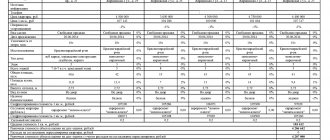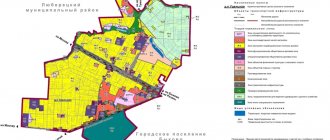All articles
116632
2021-03-13
Errors, typos, and inaccuracies found in the extract from the Unified State Register of Real Estate require correction. The material presented will tell you how to make changes to the Unified State Register, where to apply, when you can get a new statement and how much it will cost.
In what cases is it necessary to enter information into the Unified State Register of Real Estate?
Any residential property must be registered and undergo state registration. After registration, the information is stored in the database of the Federal Service for State Registration, Cadastre and Cartography. Making changes to the USRN data indicates that the previous information is no longer relevant.
Correction of information depends on who is the owner - an individual or a legal entity.
In what cases is it necessary to make changes to the Unified State Register if the owner is an individual (grounds for making changes to the Unified State Register):
- After planning, changes to the Unified State Register are inevitable.
- Construction. The subject owns the land plot and plans to build a structure on it.
- Purchase and sale, donation, transfer of residential property for rent.
- New data. The owner received a new passport and changed his last name.
- Errors. During the documentation check, errors and inaccurate data were found.
- Pledge or encumbrance.
When changing the type of real estate, liquidation and other circumstances, you need to contact Rosreestr to make changes to the Unified State Register.
Information about an object owned by an organization remains relevant until amendments are made.
Making changes to the Unified State Register for legal entities is appropriate in the following situations:
- New address. The company is registered at a new address.
- New name.
- Change in area - increase or decrease in square meters legally assigned to the organization.
- Change of location - another city.
If a legal entity acquires the right to a different type of real estate, data adjustment is required. For example, receiving an object by inheritance, removing encumbrances.
Unified State Register of Legal Entities: general information
The Unified State Register of Legal Entities (USRLE) is a database containing information about all companies operating in Russia.
Information about individuals is not included in it, but it is quite possible to find the details of non-profit organizations or peasant farms. In accordance with paragraph 1 of Art. 5 of the Federal Law “On State Registration...” dated 08.08.2001 No. 129, information about the company stored in the register includes:
- its name;
- date of state registration;
- location address;
- reorganization and liquidation procedures carried out in relation to the enterprise;
- changes made to the company’s constituent documents and other sources of information;
- data of founders and managers;
- types of economic activities carried out by the enterprise;
- in the event that a company is undergoing bankruptcy proceedings, the stage at which it is located.
During its operation, an enterprise can correct information previously entered into the register. For example, the company may change its director or one of its participants may decide to sell its share to a third party. Such changes must be promptly registered with the tax office, since the relevance of the information contained in the register is important not only for government agencies, but also for counterparties working with the enterprise.
Methods for making changes to the Unified State Register of Real Estate
There are several ways to make changes to the Unified State Register. The introduction of amendments is the initiative of the owner. An authorized person (if there is a notarized power of attorney) or representatives of the State Register can act on his behalf. Other persons cannot participate in the process (without legal grounds).
Changes to the Unified State Register of Real Estate by area of the object are made in the following ways:
- Written appeal (initiator is the owner of the property).
- Appeal from the registration authority (representatives of Rosreestr inform the owner of the plot or real estate in writing about the need to update the data).
- By decision of the court (judicial disputes).
If errors are found in the cadastre, they can be corrected in court. After receiving the decision, the subject contacts the registration authority with a request to change the information.
Attention! Before writing an appeal (application), you should order an extract from the Unified State Register (a new one as of the date of application, but no later than 7 days later).
You can send a message to the executive authorities of the city of Moscow as part of a pre-trial appeal.
1. The applicant has the right to file a pre-trial (extrajudicial) complaint against the decision and (or) action (inaction) of the executive body providing the public service, its officials and state civil servants in the provision of the public service.
2. The filing and consideration of complaints is carried out in the manner established by Chapter 2.1 of the Federal Law of July 27, 2010 N 210-FZ “On the organization of the provision of state and municipal services”, the Regulations on the specifics of filing and consideration of complaints about violations of the procedure for the provision of public services in the city of Moscow , approved by Decree of the Moscow Government of November 15, 2011 N 546-PP “On the provision of state and municipal services in the city of Moscow”, these Regulations.
3. Applicants may file complaints in the following cases:
3.1. Violation of the deadline for registering an application and other documents necessary for the provision of public services, as well as the procedure for processing and issuing a receipt for receipt of an application and other documents (information) from the applicant.
3.2. Requirements from the applicant:
3.2.1. Documents or information or the implementation of actions, the provision or implementation of which is not provided for by the regulatory legal acts of the Russian Federation and the city of Moscow for the provision of public services, including documents obtained using interdepartmental information interaction, including in information systems and resources of the city of Moscow.
3.2.2. Applications for the provision of services not included in the list of services approved by the Moscow Government that are necessary and mandatory for the provision of public services.
3.2.3. Payment of fees for the provision of public services not provided for by regulatory legal acts of the Russian Federation and the city of Moscow.
3.2.4. Documents or information, the absence and (or) unreliability of which was not indicated during the initial refusal to accept the application and documents necessary for the provision of a public service, or in the provision of a public service, except for the cases provided for in paragraph 4 of part 1 of Article 7 of the Federal Law of July 27 2010 N 210-FZ “On the organization of the provision of state and municipal services.”
3.3. Violations of the deadline for the provision of public services.
3.4. Refusal to the applicant:
3.4.1. In accepting documents, the submission of which is provided for by the regulatory legal acts of the Russian Federation and the city of Moscow for the provision of public services, on grounds not provided for by the regulatory legal acts of the Russian Federation and the city of Moscow.
3.4.2. In the provision of public services on grounds not provided for by the regulatory legal acts of the Russian Federation and the city of Moscow.
3.4.3. In the correction of typographical errors and errors in documents issued as a result of the provision of public services, or in case of violation of the established deadline for such corrections.
3.5. Other violations of the procedure for providing public services established by regulatory legal acts of the Russian Federation and the city of Moscow.
4. Complaints against decisions (actions, inaction) of officials, civil servants of an executive body providing a public service are considered by the head (deputy head) of the said executive body.
Complaints against decisions (actions, inaction) of the head (deputy head) of an executive body providing a public service are submitted by the applicant to the Moscow Government and considered by the Main Control Department of the city of Moscow.
A complaint against decisions and (or) actions (inaction) of bodies providing public services, their officials or state civil servants when carrying out procedures included in the exhaustive lists of procedures in the areas of construction in relation to legal entities and individual entrepreneurs who are subjects of urban planning relations, approved by the Government of the Russian Federation in accordance with Part 2 of Article 6 of the Code, in terms of violation of the established deadlines for the provision of a public service included in the exhaustive list of procedures in the relevant field of construction, or presentation of a requirement to carry out a procedure not included in the exhaustive list of procedures in the relevant field of construction, may be submitted by such persons in the manner established by this section, or in the manner established by the antimonopoly legislation of the Russian Federation, to the antimonopoly authority.
5. Complaints can be submitted to the bodies authorized to consider them in writing on paper or electronically in one of the following ways:
5.1. Upon personal application by the applicant (applicant’s representative).
5.2. By post.
5.3. Using the Portal.
5.4. Using the official websites of bodies authorized to consider complaints on the Internet.
5.5. In other ways provided for by the regulatory legal acts of the Russian Federation and the city of Moscow.
6. The complaint must contain:
6.1. The name of the body (organization) authorized to consider the complaint or the position and (or) surname, first name, patronymic (if any) of the relevant official to whom the complaint is sent.
6.2. The name of the executive authority of the city of Moscow, an organization subordinate to the executive authority, a multifunctional center for the provision of public services, or the position and (or) surname, first name, patronymic (if any) of the official, civil servant, employee, decisions and actions (inaction) of which are being appealed .
6.3. Last name, first name, patronymic (if any), information about the place of residence of the applicant - an individual, including one registered as an individual entrepreneur, or name, information about the location of the applicant - a legal entity, as well as contact telephone number(s), address (addresses) email (if available) and postal address to which the response should be sent to the applicant.
6.4. The date of submission and registration number of the application for the provision of public services (except for cases of appealing against the refusal to accept the application and its registration).
6.5. Information about decisions and actions (inactions) that are the subject of appeal.
6.6. Arguments on the basis of which the applicant does not agree with the decisions and actions (inactions) being appealed. The applicant may submit documents (if any) confirming the applicant’s arguments, or copies thereof.
6.7. Applicant's requirements.
6.8. List of documents attached to the complaint (if any).
6.9. Date of filing the complaint.
7. The complaint must be signed by the applicant (his representative). If a complaint is filed in person, the applicant (applicant's representative) must provide an identification document.
The authority of the representative to sign the complaint must be confirmed by a power of attorney issued in accordance with the law.
The powers of a person acting on behalf of an organization without a power of attorney on the basis of the law, other regulatory legal acts and constituent documents are confirmed by documents certifying his official position, as well as the constituent documents of the organization.
The status and powers of legal representatives of an individual are confirmed by documents provided for by federal laws.
8. A received complaint must be registered no later than the working day following the day of receipt.
9. The maximum period for consideration of a complaint is 15 working days from the date of its registration. The period for consideration of the complaint is 5 working days from the date of its registration in cases of appeal by the applicant:
9.1. Refusal to accept documents.
9.2. Refusal to correct typos and errors made in documents issued as a result of the provision of public services.
9.3. Violations of the deadline for correcting typos and errors.
10. Based on the results of consideration of the complaint, a decision is made to satisfy it (in whole or in part) or to refuse satisfaction.
11. The decision must contain:
11.1. The name of the body or organization that considered the complaint, position, surname, first name, patronymic (if any) of the official who made the decision on the complaint.
11.2. Details of the decision (number, date, place of adoption).
11.3. Last name, first name, patronymic (if any), information about the place of residence of the applicant - an individual or name, information about the location of the applicant - a legal entity.
11.4. Last name, first name, patronymic (if any), information about the place of residence of the applicant’s representative who filed the complaint on behalf of the applicant.
11.5. Method of filing and date of registration of the complaint, its registration number.
11.6. Subject of the complaint (information about the decisions, actions, or inactions being appealed).
11.7. The circumstances established during the consideration of the complaint and the evidence confirming them.
11.8. Legal grounds for making a decision on a complaint with reference to the applicable regulatory legal acts of the Russian Federation and the city of Moscow.
11.9. The decision taken on the complaint (conclusion on the satisfaction of the complaint or refusal to satisfy it).
11.10. Information about the actions taken by the body providing the public service in order to immediately eliminate identified violations in the provision of the public service, as well as an apology for the inconvenience caused and information about further actions that the applicant needs to take in order to receive the public service (if the complaint is satisfied).
11.11. Reasoned explanations about the reasons for the decision made (in case of refusal to satisfy the complaint).
11.12. Procedure for appealing a decision.
11.13. Signature of the authorized official.
12. The decision is made in writing using official forms.
13. The measures to eliminate identified violations specified in the decision include:
13.1. Cancellation of previously made decisions (in whole or in part).
13.2. Ensuring the acceptance and registration of the application, execution and issuance of a receipt to the applicant (in case of evasion or unreasonable refusal to accept documents and their registration).
13.3. Ensuring registration and delivery to the applicant of the result of the provision of a public service (in case of evasion or unreasonable refusal to provide a public service).
13.4. Correction of typos and errors made in documents issued as a result of the provision of public services.
13.5. Refund to the applicant of funds, the collection of which is not provided for by the regulatory legal acts of the Russian Federation and the city of Moscow.
14. The body or organization authorized to consider the complaint refuses to satisfy it in the following cases:
14.1. Recognition of the appealed decisions and actions (inactions) as legal and not violating the rights and freedoms of the applicant.
14.2. Filing a complaint by a person whose powers have not been confirmed in the manner established by regulatory legal acts of the Russian Federation and the city of Moscow.
14.3. The applicant does not have the right to receive public services.
14.4. Availability:
14.4.1. A court decision on the applicant’s complaint with identical subject matter and grounds that has entered into legal force.
14.4.2. Decisions on a complaint made earlier in a pre-trial (out-of-court) manner in relation to the same applicant and on the same subject of the complaint (except for cases of appealing previously made decisions to a higher authority).
15. The complaint must be left unanswered on its merits in the following cases:
15.2. The presence in the complaint of obscene or offensive language, threats to the life, health and property of officials, as well as members of their families.
15.3. If the text of the complaint (part of it), last name, postal address and email address are not readable.
15.4. If the complaint does not indicate the name of the applicant (the applicant's representative) or the postal address and email address to which the response should be sent.
15.5. When the body or organization authorized to consider the complaint receives a request from the applicant (the applicant’s representative) to withdraw the complaint before a decision is made on the complaint.
16. Decisions to satisfy the complaint and refuse to satisfy it are sent to the applicant (representative of the applicant) no later than the working day following the day of their adoption, to the postal address specified in the complaint. At the request of the applicant, the decision is also sent to the email address specified in the complaint (in the form of an electronic document signed with the electronic signature of an authorized official). In the same manner, the applicant (the applicant’s representative) is sent a decision on the complaint, in which only an email address is indicated for the response, and the postal address is missing or cannot be read.
17. If the complaint is left unanswered on the merits, the applicant (his representative) is sent, no later than the working day following the day of registration of the complaint, a written motivated notification indicating the grounds (except for cases where the postal address and email address are not indicated in the complaint email for a response or they are unreadable). The notice is sent in the manner established for sending a decision on a complaint.
17(1). A complaint filed in violation of the rules on competence established by clause 5.4 of the Regulations is sent no later than the working day following the day of its registration to the body authorized to consider the complaint, with simultaneous written notification to the applicant (his representative) about the forwarding of the complaint (for unless the complaint does not include a postal address or email address for response or is not legible). The notice is sent in the manner established for sending a decision on a complaint.
18. Filing a complaint in a pre-trial (out-of-court) manner does not exclude the right of the applicant (applicant’s representative) to simultaneously or subsequently file a complaint in court.
19. Informing applicants about the judicial and pre-trial (extrajudicial) procedure for appealing decisions and actions (inactions) committed in the provision of public services should be carried out by:
19.1. Placing relevant information on the Portal and stands at places where public services are provided.
19.2. Consulting applicants, including by telephone, email, and in person.
20. If, during or as a result of consideration of a complaint, signs of an administrative offense or crime are established, the official empowered to consider the complaint immediately forwards the available materials to the prosecutor's office.
If violations of the procedure for the provision of public services of the city of Moscow are identified, the responsibility for which is established by the Code of the City of Moscow on Administrative Offenses, the official empowered to consider the complaint must also send copies of the available materials to the Main Control Department of the city of Moscow within two working days following after the day the decision on the complaint was made (but no later than the working day following the day of expiration of the period established by federal legislation for consideration of complaints about violations of the procedure for the provision of public services).
Where changes are made to the Unified State Register of Real Estate
Where are changes made to the Unified State Register? Subjects can contact the following authorities:
- Federal Service for State Registration, Cadastre and Cartography.
- Multifunctional center (MFC).
- Court (if the authorities are higher, they refused)
If representatives of the State Register do not want to register adjustments or make changes to the area in the Unified State Register, the subject has the right to go to court, having the decision of the authority in hand to re-apply to the above-mentioned bodies.
How to make changes to the Unified State Register of Real Estate - step-by-step instructions
How to make changes to the Unified State Register of Real Estate - step-by-step instructions will help with this. Often the owners of square meters and land plots turn to the MFC, the Federal Service for State Registration, Cadastre and Cartography, and rarely to the State Services.
To make changes to the address in the Unified State Register or other data, you need to follow the algorithm of actions. To make changes to the Unified State Register of Real Estate after reorganization, redevelopment, or the appearance of current data, you need:
- Collect and prepare documentation.
- Get an extract from the Unified State Register of Real Estate (electronic)
- Fill out an application. The registration authority has a sample, follow it; other forms of application are not accepted.
- Pay the state fee. The amount of the mandatory fee depends on the method of submitting the package of documents, on who does it - an individual or a legal entity.
- Contacting the selected government agency.
The application must include the date the form was filled out, information about the applicant, address information, including postal code, contact information, for example, telephone number. Write down the list of documents attached to the application, fill out the block on approval of the plan map.
Important! In the form, the method for obtaining an answer is highlighted in a separate block. Highlight the appropriate option by providing additional information, such as your email address.
The package of documents for each subject may consist of different certificates/papers - it depends on the situation. A registration authority consultant will help you reduce time and prepare the necessary documentation.
The procedure for filling out an application on form P13014
When drawing up an application for registration of changes in the Unified State Register of Legal Entities, you must follow the rules prescribed in Appendix 13 to the Federal Tax Service order No. ED-7-14 dated August 31, 2020 / [email protected]
- Form P13014 must be filled out by hand or using computer technology. In the latter case, the signs are printed in capital letters, Courier New font, size 18, black. When writing with a pen, use black, purple, or blue ink and write in block letters.
- In each field (squares) only one character is indicated, with the exception of the date, number in the form of a fraction, percentage, monetary units and OKVED codes. To record a date, you need to use 3 fields in order from left to right, separated by a dot, for example: 01.2021. The fraction is divided into two fields by the sign of a vertical inclined line (for example, 1/7), the field with percentages is divided by a dot (for example: 125521.25).
- When indicating the passport series, an indentation is made between the numbers, and the number is written in order in each cell - 14 14 123456, while you also need to skip one square between the series and the number.
- The contact mobile phone numbers are indicated as follows: +79109876543.
- Between words in the text there is a space in the form of empty cells, no hyphen is placed.
- Information about the address of the entrepreneur's location is indicated by using abbreviated names of types of settlements, for example: village. Dubrava.
List of documents that are the basis for entering information into the Unified State Register of Real Estate
The list of documents that serve as the basis for entering information into the Unified State Register is regulated by law. To obtain a complete list, please contact the consultants of the selected government agency for assistance.
Before you start collecting/preparing documentation, you need to determine what changes they concern.
The main documents for making changes to the Unified State Register include:
- Applicant's passport.
- Appeal.
- Payment of state duty.
- Documents for a residential property (technical passport, house plan, cadastral plan, etc.).
- Certificate from USRN.
If the owner of a residential property acts as the applicant, there is no need to notarize the papers. If a trusted person applies on behalf of the owner of the square meters, the certificates are notarized.
The appeal must be submitted only in writing, according to the form established by law. After paying the obligatory dispute, a receipt is attached to the general package.
If there is a court decision, attach it to the general package. Also attach the lease/rental agreement, if you have one.
To correct the data, you need to provide information about what has changed, on what basis the changes occurred, and the changes were adopted.
Once documents with corrections are received, the material will be displayed in digital and paper form.
How much does it cost to enter information into the Unified State Register of Real Estate?
How much it costs to enter information into the Unified State Register of Real Estate is determined by law. The cost depends on a number of factors: what changes need to be made and what they concern, who acts as an applicant - a private or legal entity.
If the application came from an individual, correcting the data will cost 300-400 rubles.
If the application is submitted by a legal entity, you will have to pay 1,000 rubles to obtain a new certificate.
Attention! An integral document is an extract from the Unified State Register , it does not have to be ordered from the MFC in paper form and wait 5 working days, you can buy it on our website in electronic form in 10 minutes (signed with an electronic digital signature by an employee of Rosreestr)
Why is it dangerous to use the services of Rosreestr duplicate sites?
The agency warns the population and legal entities to use the services of such sites: most often they directly violate the legislation on personal data. According to Rosreestr, the copyright holders of “doubles” are individuals from the USA, the European Union and Ukraine.
By using the services of such sites, a person provides personal data “in violation of the law for the systematization, storage, accumulation and transfer of personal data to the jurisdictions of other countries of the world.” In this case, Rosreestr is not responsible for the processing of personal data transferred to duplicate sites.
The cost of services offered on duplicate sites is usually higher than that officially approved by Rosreestr and the Federal Cadastral Chamber, and the quality is not guaranteed. Rosreestr is responsible for the information provided, and duplicate sites may provide irrelevant, false information or not provide the service at all.










